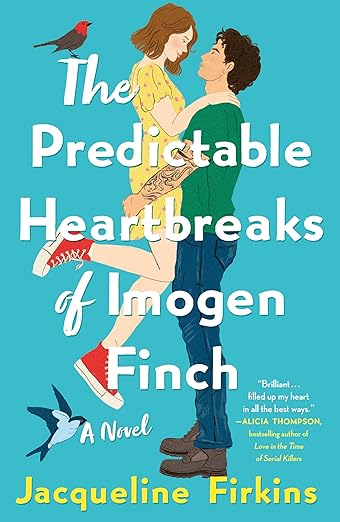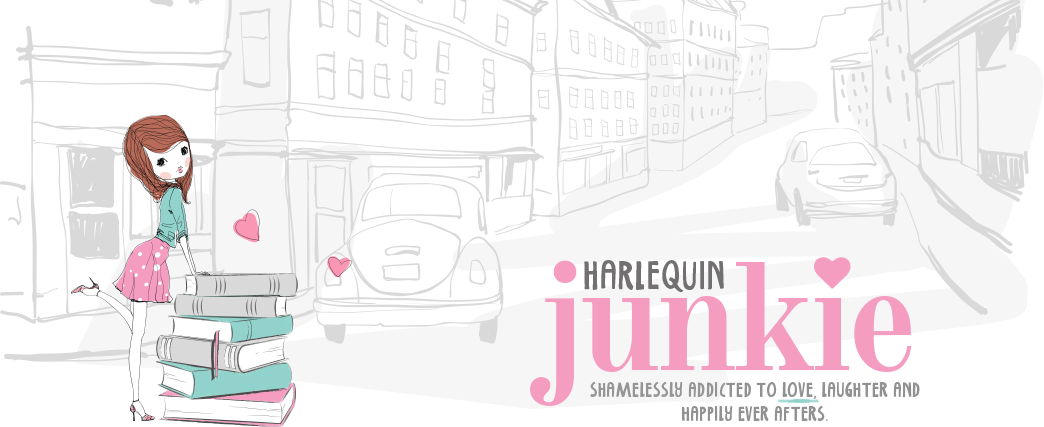Today it is my pleasure to Welcome author Jacqueline Firkins to HJ!

Hi Jacqueline and welcome to HJ! We’re so excited to chat with you about your new release, The Predictable Heartbreaks of Imogen Finch!
Please summarize the book for the readers here:

Please share your favorite line(s) or quote from this book:
The word gratitude doesn’t even begin to cover what I’m feeling right now. I suppose that’s why someone invented the word love.
Please share a few Fun facts about this book…
- Imogen is named after a character from Shakespeare’s Cymbeline. Her surname Finch is for a small, social bird that’s sometimes kept as a pet, and is part of a running theme about birds, flight, nesting, and migration that runs throughout the story.
- Eliot’s plotline is inspired by a Henry James’ novel called Washington Square. I love stories where a house isn’t just a house, but becomes a metaphor for something more.
- Imogen starts the story going through her 17th breakup, and several other breakups are depicted within the story. While all of them are partly fictionalized (including the names), they are also all partly autobiographical. Not sure if that’s a fun fact, or an embarrassing fact, but I have enjoyed finding a way to laugh at some of my more unfortunate relationships.
- My father collected the coloured glass fishing floats that are featured in the story. He gave them up during a downsize years ago, so putting them in the story was a way of telling him we haven’t really lost them. They’re still just as beautiful and just as magical, even though they’re in a novel and not an old sea chest.
What first attracts your Hero to the Heroine and vice versa?
It’s a second chance love story, so Imogen and Eliot formed their initial bond when they were quite young. She was drawn to his quiet kindness. He was drawn to her fierce determination. I always enjoy reading romances in which the leads’ physical attractiveness isn’t the driving force of the draw between them, so that’s what I tend to write.
Did any scene have you blushing, crying or laughing while writing it? And Why?
There’s a scene with a cat watching a blowjob. It doesn’t make me blush, but the thought of my mother reading it sure does!
Readers should read this book….
- If they like stories about messy characters figuring out their lives, both within the context of a romance and without.
- If they like small town settings that have a bit of grit to them.
- If they have a creative streak but haven’t always known what to do with it.
- If they love dogs, the ocean, complicated family dynamics, or tight friendships.
- If they enjoy a hint of magic in their stories.
What are you currently working on? What other releases do you have in the works?
I tend to be quite private until I know something is going to leave my hard drive, so I’ll drop only two hints about my current work in progress: academia and pirates.
Thanks for blogging at HJ!
Giveaway: A signed, finished copy of The Predictable Heartbreaks of Imogen Finch. US/Canada please.
To enter Giveaway: Please complete the Rafflecopter form and Post a comment to this Q: Imogen wrestles with this question throughout the book: “how do we identify our limitations with any sense of certainty unless we find a way to push past them? And when do we simply accept our limitations for what they are and get on with life?” How would you answer it for yourself?
Excerpt from The Predictable Heartbreaks of Imogen Finch:
I’m flying across the kitchen so fast, beelining it to the toaster, I don’t see my mom standing by the glass doors to the backyard until she speaks, halting me mid-step.
“Seven herons,” she says in a tone so ominous even Stephen King would tremble at the sound. “Seven herons and six grebes.”
“Six grebes,” I repeat, instantly aborting my hopes of making it to work on time. This is life with my mom. One minute I’m an average twenty-eight-year-old woman who isn’t living up to her potential. In the next, I’m dropped into an eerie convo about ducks. “The black and white ones with the funny little mohawks?”
“The cresteds, yes.” My mom nods as she turns toward me. A frail hand rises to her lips and rests there, almost as though she’s trying to silence herself. “A change is coming, Imogen. A shuffling of expectations. A surprise.” Her eyes widen, though I can’t tell if that means the surprise she just referred to will be good or bad.
It’ll probably be bad. Few of my mom’s prophecies fall into the HEA category, though the range of predicted catastrophes is broad, from minor friend spats to lifelong curses. She swears this is simply the way of things, and has been for countless generations. According to her stories, prophesying runs in our family, popping up every third or fourth generation, manifesting in early childhood, and only in the women. One of my ancestors milked it in the carnival circuit, shrouding herself in black lace veils and delivering doom and gloom from the back of a dusty old caravan. Another was a secret military advisor to Napoleon. It’s a colorful family history, if also an embellished one.
My mom watches as I resume my attempt to throw together a hasty breakfast, pulling a bread loaf from a turquoise tin breadbox we inherited from my grandparents, along with half the contents of this house. A few of the items are vintage chic, but most are old, ugly, and in need of replacement. Not that we will replace them because A: my mom has assigned profound importance to everything we own and B: we don’t have much money to spare. Too bad my mom can’t foretell a windfall.
“A surprise, huh?” I ask when I can’t stand the silent staring anymore.
“The formations suggested an unexpected loss. A severing. A transformation.”
“That’s a lot of information for one flock of birds.”
“It’s the grebes,” she says as though this explains everything.
“What if one was a piece of driftwood? Hard to tell when it’s so foggy.”
“No, no. There were six. I counted them over and over.” My mom turns toward the glass doors again. Outside, beyond a motley collection of windchimes and a pair of beat-up lawn chairs, a pale sun is trying hard to burn away the morning fog. We only live a block from the beach, though our ocean view is obstructed by a three-story stucco apartment building that went up the year I was born, painted in a dull green that was probably supposed to blend in with nature but has yellowed with age, making it look like regurgitated pea puree. It’s the perfect symbol of life in Pitt’s Corner. Something transcendent is always close by, but it’s obscured by a cheaply manufactured eyesore.
“And the herons?” I ask, unsure why the grebes are getting all the credit.
“Yes. Exactly. The herons.” My mom fails to take in my look of confusion as she continues starting through the doors, though whether she’s looking at the ugly building, the fog, or a horizon in her mind’s eye, I can’t tell. “Thirteen birds. And a shift in the wind. I felt it in my bones, just like when your father died.”
The mention of my dad slows my movement with the toaster. This is the problem with my mom’s prophecies. Despite how batshit crazy she often sounds, finding omens in whatever elements of nature she’s paying attention to on any given day—birds, frogs, flies, clouds, ripples in puddles, stripes on a caterpillar, the reeds that poke up through the Oregon sand dunes—all of her prophecies come true. Not that she knows exactly what will happen, and the details are just general enough to allow room for skepticism. They’re also accurate enough to support the theory that she might, in fact, be a witch.
She knew when my dad’s fishing boat would sink in a squall, taking him and most of his crew with it. She knew when my brother Antony would wreck his friend’s uninsured sportscar and hemorrhage his college fund paying off the cost. She knew my sister Lavinia was destined to travel to Europe at age twenty-three, and then stay there, finding contentment as a literary researcher in Oxford. And she knew on my sixth birthday that I would never be first at anything.
Naturally, I was devastated by her pronouncement. I sobbed. I screamed. I railed at the world, furious that I was doomed to a lifetime of mediocrity I had yet to wrap my naïve little brain around. I only knew I hated limitations. I also had a fierce determination few could reckon with. My tears shed, I turned my attention to proving my mom wrong. Over the following years, I entered poetry, art, and baking contests. I played every sport I could find the time for. I auditioned for plays and talent competitions. I joined debate and math teams. I busted my ass for top grades. I ran for student offices, even ones I didn’t want, as long as I had even the slimmest chance of getting voted in.
Twenty-two years later, after accumulating countless red and white ribbons without ever nudging past second place, I’ve long since stopped fighting my curse. I wish I could say that means I’ve found peace with it, but I can’t. Underneath a light veneer of cynicism about my lot in life, I’ve never stopped yearning, just once, to be more than a nominee, a runner-up, a forgettable name among the ranks, or a girl a guy dumped once he met a hotter, smarter, funnier, more interesting girl he really wanted to be with. Case in point: Greg’s spaghetti confession. Predictable by now, but still . . .
Excerpt. © Reprinted by permission. All rights reserved.
Book Info:
Imogen Finch has just been through her seventeenth breakup. She saw it coming, so she’s not as crushed as she might be, but with all seventeen of her exes leaving her for other partners, she’s come to believe a prediction her well-intentioned and possibly clairvoyant mother made over twenty years ago: that Imogen would never come first at anything or to anyone. Is her love life failing due to a magical curse? Insufficient effort? Poor timing or personality mismatches? Everyone has opinions on the matter. Imogen’s ready to give up altogether. But when Eliot Swift, her secret high school crush, returns to their small coastal town after a decade of nomadic travels, Imogen has new motivation to try again. Eliot’s full of encouragement. He suggests that her curse is not only imagined, it’s easily breakable. All they need is one win–any win–and she can believe in love, and in herself again.
From trivia games to swimming races to corn-shucking contests, the pair sets out to snag Imogen her first first. But when victory proves more elusive than Eliot anticipated, and when his deep-seeded wanderlust compels him to depart for far away places, Imogen fears she’s destined to remain in second place forever. Fortunately for them both, sometimes magic lingers in the most unexpected places. And love is far from predictable.
Book Links: Amazon | B&N | kobo | Google |
Meet the Author:
Jacqueline’s a writer, costume designer, and lover of beautiful things. She’s on the fulltime faculty in the Department of Theatre & Film at the University of British Columbia where she also takes any writing class they’ll let her into. When not obsessing about where to put the buttons or the commas, she can be found running by the ocean, eating excessive amounts of gluten, listening to earnest love songs, and pretending her dog understands every word she says.
Website | Twitter | Instagram | GoodReads |


Latesha B.
Limitations are only stumbling blocks that need to be worked around. You have to keep thinking outside the box to overcome them.
Leeza Stetson
I think trying different ways to get beyond your limitations to see if you can. If time and again you can’t, I think you take a deep breath, square your shoulders, and move on to do things you can do.
erahime
There are certain situations that overcoming limits can be fruitful, and there are other situations that knowing the limitations must be acknowledged.
hartfiction
The power to heal
Debra Guyette
It depends on the limitation because you some you cannot work around but have to find a way to work with the limitation. For example I am allergic to hay and so cannot work in a barn but I can still work with horses.
TexasBookLover
Most people know what their limits are and if they are willing to break them or why they would.
Amy R
How would you answer it for yourself? What I am comfortable and can live with.
Rita Wray
I have my limitations.
bn100
no idea
Lori R
I have no idea.
Daniel M
healing
Glenda M
There are a few limitations that are hardcore, zero workaround and bypassing them. Others might be perceived ones that unless you attempt to surpass them, will always be there. There is, of course, a time to admit that some things are limitations for a reason. There’s no point in being bitter over that fact. Accept it and live your life.
Dianne Casey
I think you have to try and work past your limitations or learn how to deal with them.
Diana Hardt
I’m not sure.
Linda Herold
I think you just have to do your best. You learn from your mistakes and move on.
Kathleen O
Healing
Bonnie
We all have limitations. It is best to acknowledge them and move on with life.